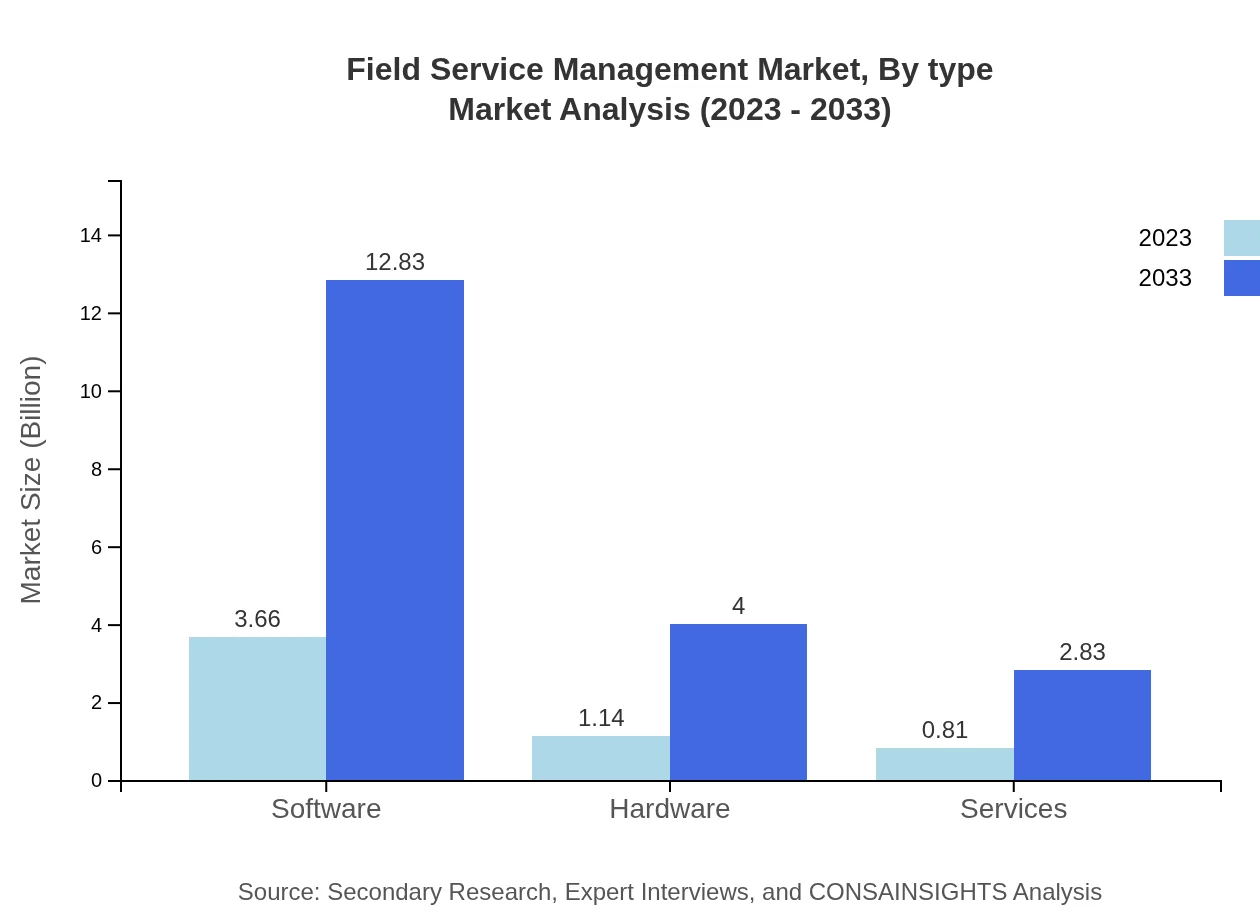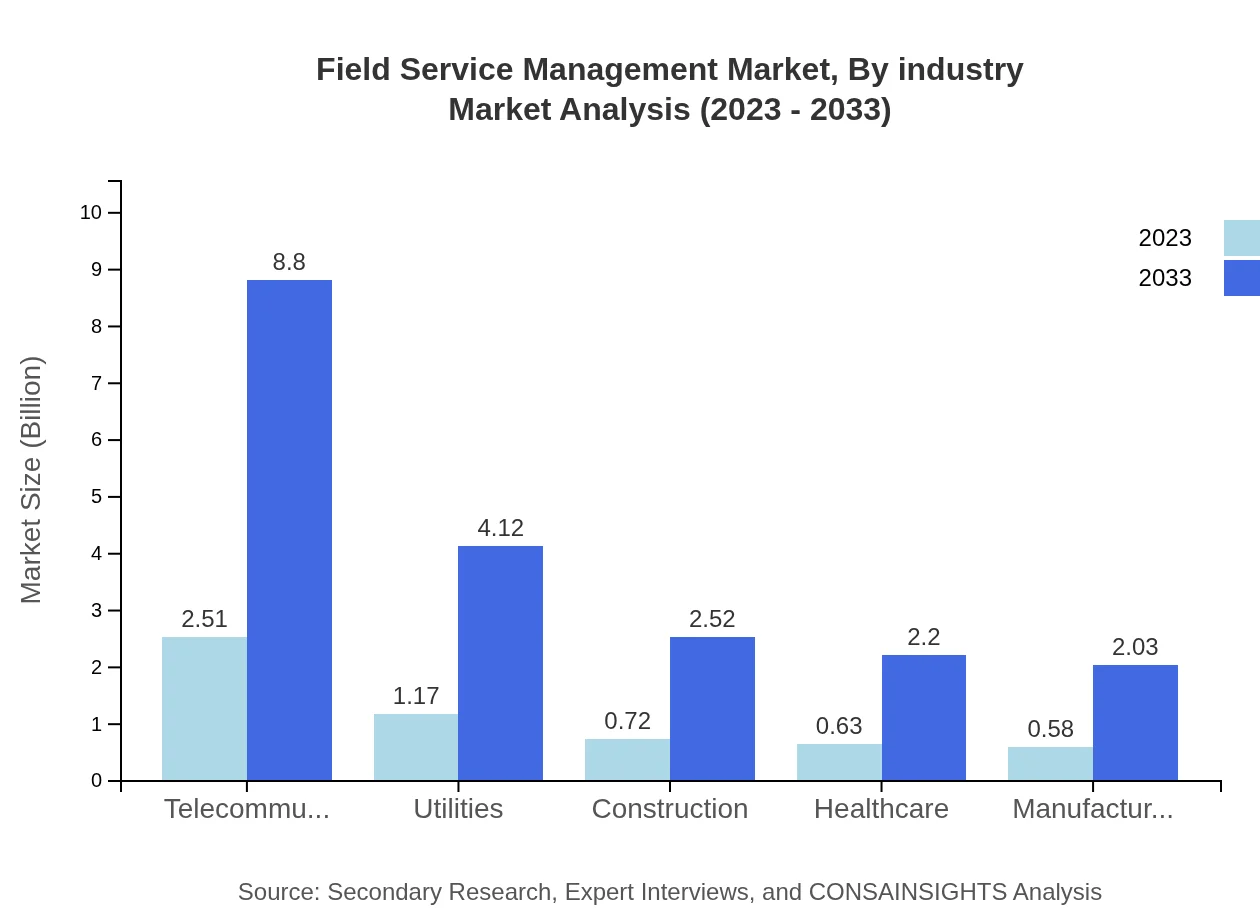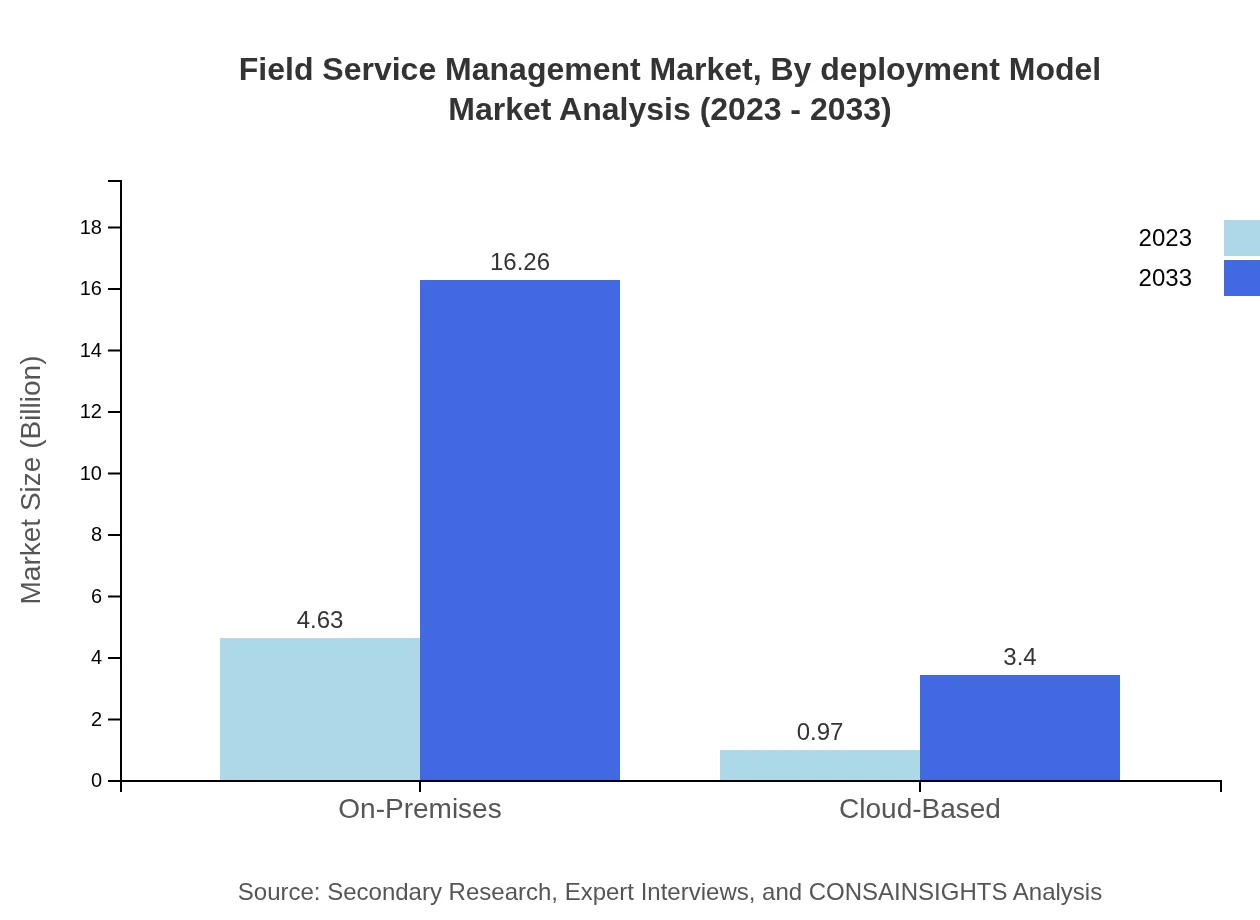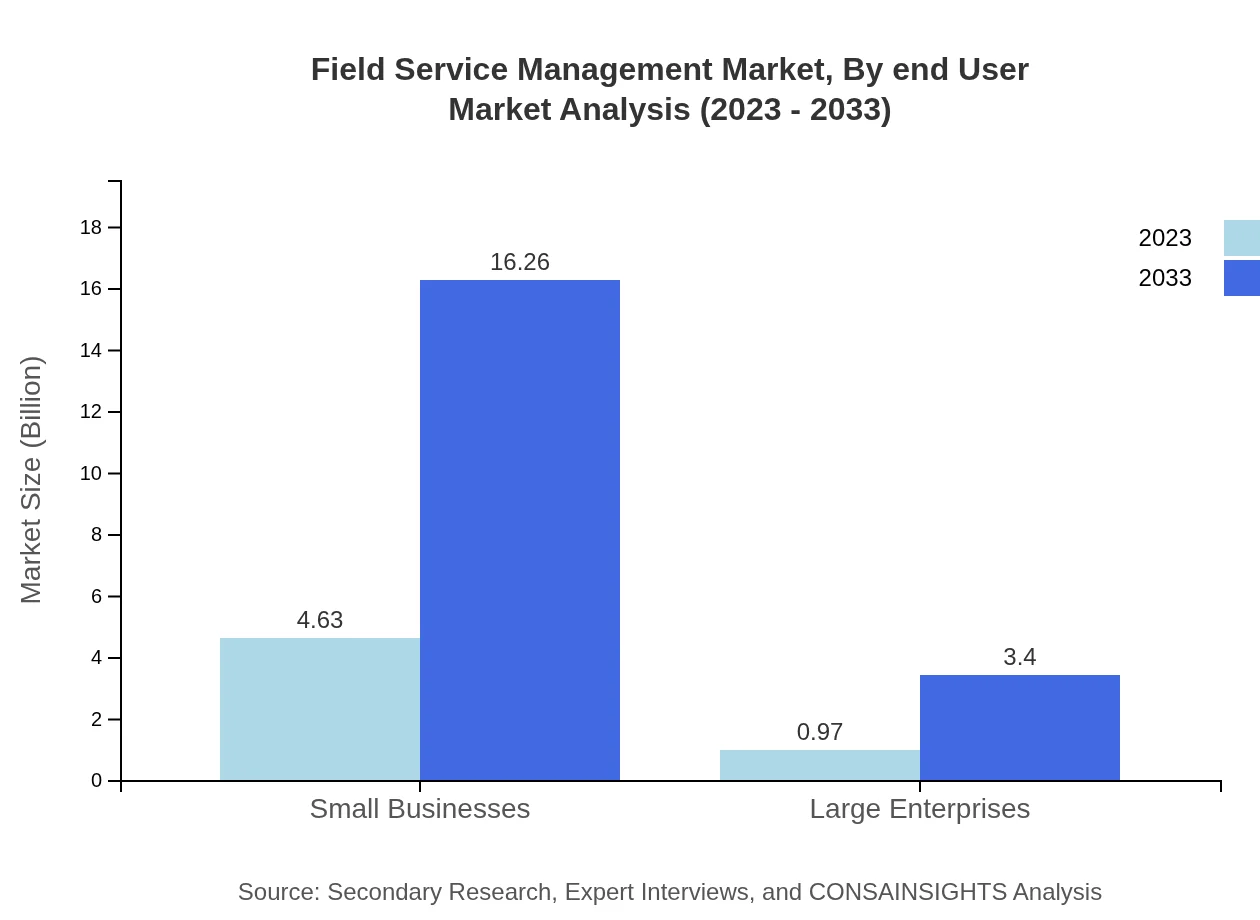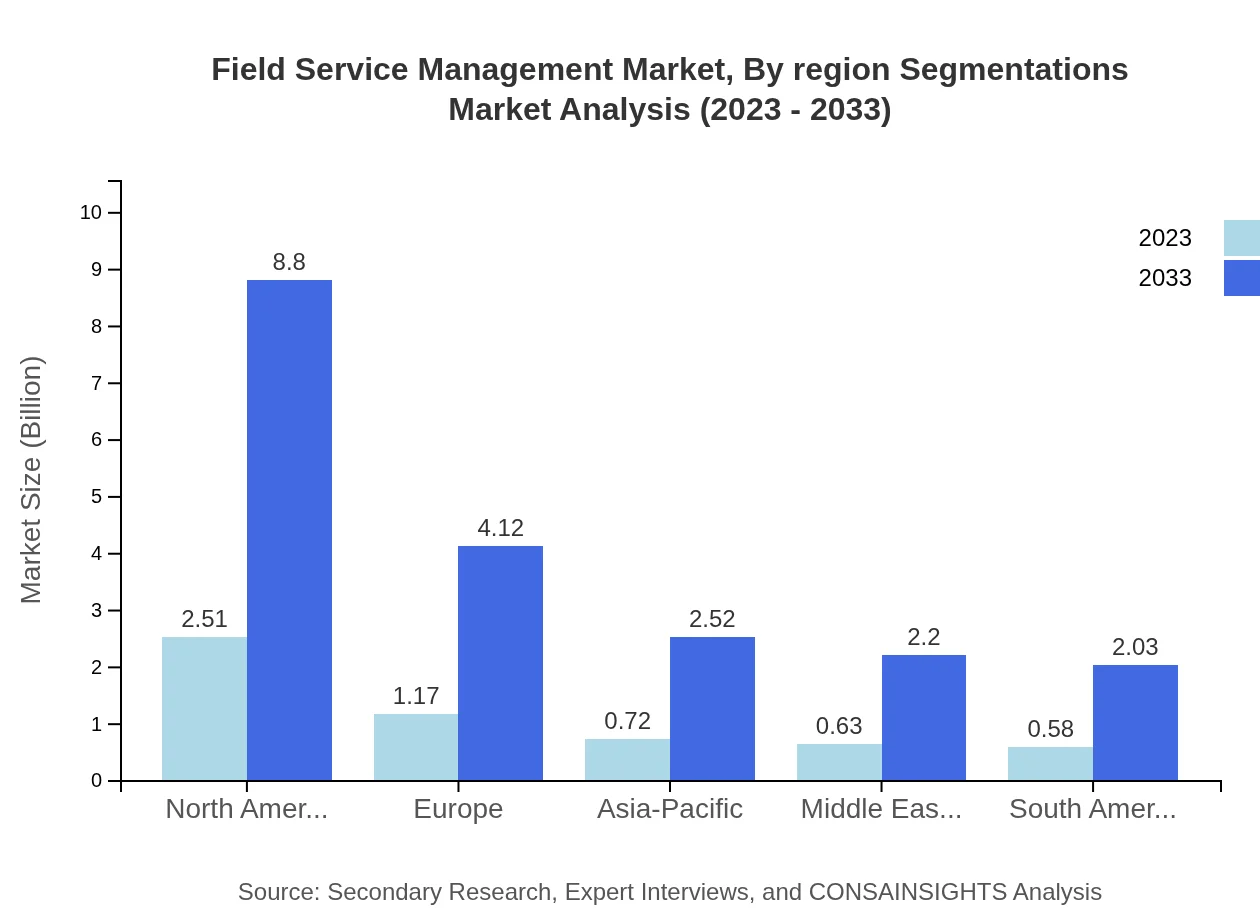Field Service Management Market Report
Published Date: 31 January 2026 | Report Code: field-service-management
Field Service Management Market Size, Share, Industry Trends and Forecast to 2033
This report provides a comprehensive analysis of the Field Service Management market from 2023 to 2033, covering market size, trends, industry insights, regional dynamics, and forecasts.
| Metric | Value |
|---|---|
| Study Period | 2023 - 2033 |
| 2023 Market Size | $5.60 Billion |
| CAGR (2023-2033) | 12.8% |
| 2033 Market Size | $19.66 Billion |
| Top Companies | Salesforce, ServiceTitan, Oracle, Microsoft, SAP |
| Last Modified Date | 31 January 2026 |
Field Service Management Market Overview
Customize Field Service Management Market Report market research report
- ✔ Get in-depth analysis of Field Service Management market size, growth, and forecasts.
- ✔ Understand Field Service Management's regional dynamics and industry-specific trends.
- ✔ Identify potential applications, end-user demand, and growth segments in Field Service Management
What is the Market Size & CAGR of Field Service Management market in 2023?
Field Service Management Industry Analysis
Field Service Management Market Segmentation and Scope
Tell us your focus area and get a customized research report.
Field Service Management Market Analysis Report by Region
Europe Field Service Management Market Report:
In Europe, the FSM market is set to expand from $1.74 billion in 2023 to $6.09 billion by 2033. Strong regulatory environments, focus on customer experience, and technological readiness foster market growth. Leading companies are investing in innovative FSM solutions to enhance operational efficiency and optimize field workforce deployment.Asia Pacific Field Service Management Market Report:
The Asia Pacific region is characterized by rapid adoption of FSM technologies, with the market size projected to grow from approximately $0.92 billion in 2023 to $3.24 billion in 2033. Factors such as urbanization, expanding telecommunications, and increasing service-oriented businesses drive this growth. The region is witnessing significant investments in digital transformation initiatives, facilitating the deployment of advanced FSM solutions.North America Field Service Management Market Report:
North America dominates the FSM market, with a projected increase in size from $2.14 billion in 2023 to $7.50 billion in 2033. The high adoption rate of FSM solutions is driven by the presence of major technology providers and a robust service industry. Companies are keen to integrate FSM solutions to streamline operations amid growing competition and customer demand for real-time service updates.South America Field Service Management Market Report:
The South American FSM market is relatively smaller, expected to increase from $0.19 billion in 2023 to $0.67 billion by 2033. The growth is supported by improvements in infrastructure and a gradual shift towards digital solutions in service delivery. Regional players are beginning to recognize the value of leveraging FSM platforms to enhance workforce efficiency and customer satisfaction.Middle East & Africa Field Service Management Market Report:
The Middle East and Africa region expects growth from $0.61 billion in 2023 to $2.15 billion in 2033. Political and economic instability has hindered previous growth, but recent investments towards modernizing business operations are leading to increased FSM adoption. There is a rising demand for solutions that improve service efficiency and operational transparency.Tell us your focus area and get a customized research report.
Field Service Management Market Analysis By Type
The FSM market is categorized mainly into software, hardware, and services. Software is the leading segment with market sizes forecasted to rise from $3.66 billion in 2023 to $12.83 billion in 2033, holding a significant market share of 65.27% by 2033. The hardware sector is expected to expand from $1.14 billion to $4.00 billion while maintaining a share of about 20.34%. Services, though smaller, will grow from $0.81 billion to $2.83 billion, representing 14.39% of the market. This segmentation illustrates the strategic focus required from providers to innovate in software solutions while enhancing hardware capabilities in conjunction with service offerings to meet consumer demand effectively.
Field Service Management Market Analysis By Industry
The industry segmentation of the FSM market includes telecommunications, utilities, healthcare, manufacturing, and construction. Telecommunications leads with a size projected to increase from $2.51 billion in 2023 to $8.80 billion by 2033, depicting a healthy market share of 44.75%. Utilities follow with a significant increase from $1.17 billion to $4.12 billion, holding 20.94% market share. Other industries like healthcare, with projected growth from $0.63 billion to $2.20 billion, manufacturing, and construction present opportunities for market players to customize solutions tailored to industry-specific operational challenges.
Field Service Management Market Analysis By Deployment Model
The market is also segmented by deployment model into on-premises and cloud-based solutions. The on-premises model is anticipated to maintain dominance, growing from $4.63 billion in 2023 to $16.26 billion by 2033, holding 82.72% share. Conversely, cloud-based solutions will expand from $0.97 billion to $3.40 billion with a 17.28% share, reflecting the shift towards flexibility and scalability in service delivery. This split showcases market dynamics where organizations balance traditional and modern deployment strategies to accommodate diverse operational requirements.
Field Service Management Market Analysis By End User
In terms of end-users, the FSM market is segmented into small businesses and large enterprises. Small businesses are forecasted to grow significantly from $4.63 billion in 2023 to $16.26 billion by 2033, capturing a dominating share of 82.72%. Large enterprises, while smaller in overall market size, are also expected to grow from $0.97 billion to $3.40 billion, representing 17.28%. This segmentation reflects the strategic investments small firms make in FSM solutions to enhance productivity and delivery efficiency.
Field Service Management Market Analysis By Region Segmentations
The regional segmentations provide a clear understanding of the FSM market dynamics across various geographical territories. North America remains the largest market, primarily due to high adoption rates and the presence of prominent technological firms. Europe follows closely, driven by regulatory frameworks that encourage efficient service practices. In Asia Pacific, rapid urbanization and industrialization contribute to a burgeoning FSM market, while South America and the Middle East and Africa maintain lower market sizes but show promising growth trajectories fueled by digital transformation.
Field Service Management Market Trends and Future Forecast
Tell us your focus area and get a customized research report.
Global Market Leaders and Top Companies in Field Service Management Industry
Salesforce:
Salesforce is a leading provider of cloud-based software offerings, including solutions for field service management. Their product enables real-time tracking, scheduling, and management of field personnel and resources.ServiceTitan:
ServiceTitan specializes in service management software for plumbing, HVAC, and electrical service companies. They offer comprehensive tools to manage service operations effectively, improving efficiency and customer satisfaction.Oracle:
Oracle provides a broad range of cloud applications and infrastructure technologies, with advanced field service management capabilities that enhance service delivery and resource allocation.Microsoft:
Microsoft’s FSM solutions, integrated into Dynamics 365, provide extensive functionalities for scheduling, managing, and optimizing field services, allowing organizations to streamline their operations.SAP:
SAP offers an array of enterprise software solutions, including field service management capabilities that allow businesses to optimize the management of service processes and personnel.We're grateful to work with incredible clients.









FAQs
What is the market size of Field Service Management?
The Field Service Management market is currently valued at approximately $5.6 billion as of 2023, with a strong compound annual growth rate (CAGR) of 12.8%, projected to grow considerably by 2033.
What are the key market players or companies in this Field Service Management industry?
Key players in the Field Service Management industry include companies like ServiceTitan, Salesforce, SAP, Oracle, and Microsoft, each contributing to the market with innovative solutions that enhance service delivery.
What are the primary factors driving the growth in the Field Service Management industry?
Growth drivers for the Field Service Management industry include technological advancements, rising customer expectations, the need for operational efficiency, increasing adoption of cloud-based solutions, and the growth of mobile technology.
Which region is the fastest Growing in the Field Service Management?
North America ranks as the fastest-growing region in the Field Service Management market, projected to grow from $2.14 billion in 2023 to $7.50 billion by 2033, followed closely by Europe.
Does ConsaInsights provide customized market report data for the Field Service Management industry?
Yes, ConsaInsights offers customizable market report data tailored to specific needs within the Field Service Management industry, allowing clients to gain insights relevant to their unique market conditions.
What deliverables can I expect from this Field Service Management market research project?
Deliverables from the Field Service Management market research project typically include market size analysis, competitive landscape reports, trends identification, regional breakdowns, and strategic recommendations for market entry or growth.
What are the market trends of Field Service Management?
Current trends in the Field Service Management industry include increased adoption of AI and machine learning, growing importance of customer experience, a rise in mobile applications, and the transition towards cloud-based service solutions.


